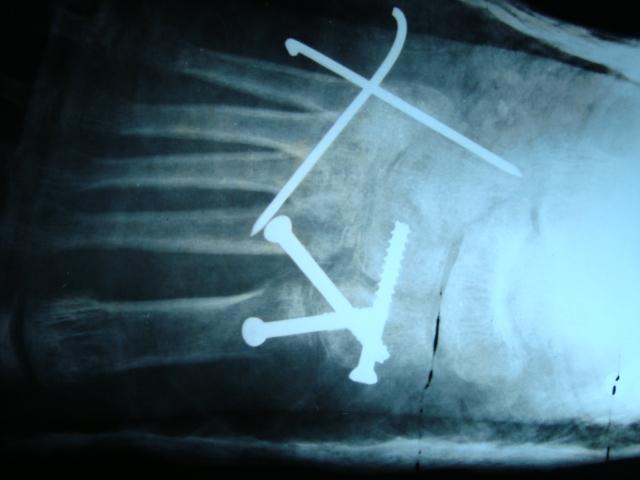[box type=”bio”] What to Learn from this Article?[/box]
1.Differential Diagnosis of Osteopoikilosis?
2.Approach to patient of osteopoikilosis presenting with traumatic fracture?
Case Report | Volume 3 | Issue 2 | JOCR April-June 2013 | Page 12-15 | Bansal R, Pathak AC, Sheth B, Patil AK
Authors: Rohan Bansal[1], Aditya C Pathak[2], Binoti Sheth[3], Atul K Patil[3].
[1] Department Of Orthopaedics, Government Medical College, Miraj and PVPGH, Sangli. India
[2] Dr LH Hiranandani Hospital, Powaii, Mumbai.
[3] Department of Orthopaedics, Lokmanya Tilak Medical College & Sion Hospital, Mumbai. India
Address of Correspondence:
Dr Rohan Bansal : Assistant Professor, Department Of Orthopaedics, Government Medical College, Miraj and PVPGH, Sangli- 416416. Email- rohan_00140@yahoo.com
Abstract
Introduction: Osteopoikilosis or osteopathia condensans disseminata is a rare hereditary autosomal dominant sclerosing bone dysplasia. Patients are usually asymptomatic and the diagnosis is usually made incidentally on radiographs which show presence of symmetric, multiple, well defined, small ovoid areas of increased radiodensity clustered in peri-articular osseous regions with propensity for epiphyseal and metaphyseal involvement. There are no increased risks of pathological fracture in a case of osteopoikilosis and traumatic fracture healing in a case of osteopoikilosis is similar to fracture occurring in other normal patients.
Case Report: A 34 years male, electrician came with history of accidental fall from height while working in office leading to development of pain and swelling over left lower leg and ankle diagnosed with Ruedi-Allgower classification type I pilon fracture(without fibula fracture) no distal neuro-vascular deficit. Patient was offered surgical treatment in form of open reduction and internal fixation of tibial fracture by plate osteosynthesis using antero-medial approach , showed complete union and was followed up for eight months.
Conclusion: Osteopoikilosis has a benign course and it should always be kept as a possible differential diagnosis for osteoblastic metastasis to avoid diagnositic dilemma. Diagnosis can be settled by routine x-rays ( for type ,extent and site of lesions, bones affected), clinical features of patient , histopathology and other systemic or pre-existing conditions.
Keywords: Fracture, Osteopoikilosis, union, Pilon, Osteoblastic metastasis
|
How to Cite This Article: Bansal R, Pathak AC, Sheth B, Patil A. Traumatic Fracture in a patient of Osteopoikilosis with review of literature. Journal of Orthopaedic Case Reports April- June 2013: 3(2); 16-20. Available from: https://www.jocr.co.in/wp/2013/04/13/2250-0685-095-fulltext/ |
(figure 1) | (figure 2) | (figure 3) | (figure 4) | (figure 5) | (figure 6)
[Abstract] [Full Text HTML] [Full Text PDF]
[rate_this_page]
Dear Reader, We are very excited about New Features in JOCR. Please do let us know what you think by Clicking on the Sliding “Feedback Form” button on the <<< left of the page or sending a mail to us at editor.jocr@gmail.com





